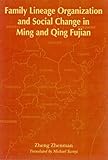Family Lineage Organization and Social Change in Ming and Qing Fujian / Zhenman Zheng.
Material type: TextPublisher: Honolulu : University of Hawaii Press, [2001]Copyright date: ©2001Description: 1 online resource (392 p.)Content type:
TextPublisher: Honolulu : University of Hawaii Press, [2001]Copyright date: ©2001Description: 1 online resource (392 p.)Content type: - 9780824823337
- 9780824842017
- 306.85
- online - DeGruyter
- Issued also in print.
| Item type | Current library | Call number | URL | Status | Notes | Barcode | |
|---|---|---|---|---|---|---|---|
 eBook
eBook
|
Biblioteca "Angelicum" Pont. Univ. S.Tommaso d'Aquino Nuvola online | online - DeGruyter (Browse shelf(Opens below)) | Online access | Not for loan (Accesso limitato) | Accesso per gli utenti autorizzati / Access for authorized users | (dgr)9780824842017 |
Frontmatter -- Contents -- Illustrations -- Ming and Qing Reign Periods -- Terms for Measures and Money -- Translator's Preface -- 1. Introduction -- 2. Family Structure and the Household Development Cycle -- 3. A Basic Typology of Lineage Organization -- 4. The Development Process of Lineage Organization -- 5. Family Lineage Organization and Social Change -- 6. Conclusion -- Notes -- List of Characters -- Bibliography -- Index
restricted access online access with authorization star
http://purl.org/coar/access_right/c_16ec
This work is the result of more than a decade of research on the Chinese household and lineage in the southeastern province of Fujian during the Ming and Qing period (1368-1911). It offers new interpretations of the Chinese domestic cycle, the relationship between household and larger kinship groups, and the development of lineage society in south China. Using hundreds of previously unknown lineage genealogies, stone inscriptions, and land deeds, Zheng Zhenman provides a candid view of how individuals and families confronted the crucial issues of daily life: how to minimize taxes or military conscription; how to balance the ideological imperatives of ancestor worship with practical concerns; how to deal with the problems of dividing the household estate. His research leads to an exploration of issues such as the relation of state to society and the compatibility of Chinese culture and capitalism. This complete translation allows access to some of the most exciting new research being done in Chinese social history. Zheng's book draws on important materials largely unknown to Western scholars, comes to novel conclusions about society in late imperial China, and illustrates the importance of the non-Western perspective in studying the history of the world outside the West.
Issued also in print.
Mode of access: Internet via World Wide Web.
In English.
Description based on online resource; title from PDF title page (publisher's Web site, viewed 02. Mrz 2022)


